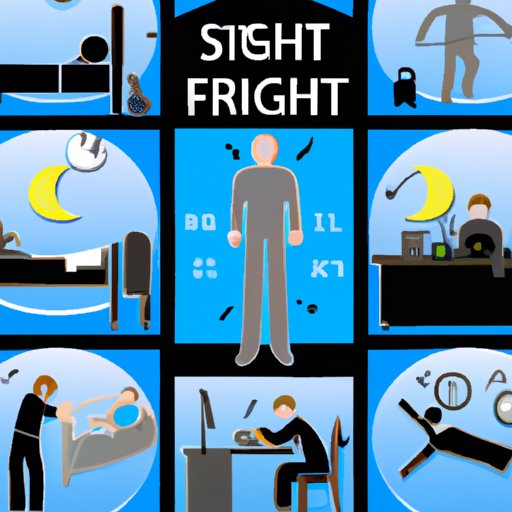Introduction
Working the night shift can be a stressful and demanding job. It often requires workers to stay up all night and disrupts their natural sleep-wake cycle, leading to fatigue and other physical and mental health problems. In this article, we will explore the potential health risks associated with working nights, as well as strategies for dealing with them. We will also hear from a night shift worker about their experience, and get advice from an expert in occupational health and safety.
A Review of the Scientific Research on the Effects of Night Shift Work on Physical and Mental Health
Studies have shown that working the night shift can have negative impacts on physical and mental health. Here, we review some of the scientific research on the subject.
Studies on the Impact of Night Shift Work on Sleep Patterns
Several studies have found that working the night shift can lead to disruptions in sleep patterns. A study published in the Journal of Clinical Sleep Medicine found that night shift workers were more likely to report poor sleep quality, daytime sleepiness, and insomnia than day shift workers. Another study published in the journal Chronobiology International found that night shift workers experienced more disturbances in the circadian rhythm (the body’s natural 24-hour clock) compared to day shift workers. This disruption in the circadian rhythm can lead to fatigue, difficulty concentrating, and impaired performance.
Studies on the Impact of Night Shift Work on Cognitive Functioning
Research has also shown that working the night shift can have a negative impact on cognitive functioning. A study published in the journal Occupational and Environmental Medicine found that night shift workers had poorer memory recall and slower reaction times than day shift workers. Another study published in the journal Chronobiology International found that night shift workers had lower scores on tests of executive functioning, such as reasoning and planning abilities, than day shift workers.
Studies on the Impact of Night Shift Work on Stress Levels
Studies have also found that working the night shift can increase stress levels. A study published in the journal Workplace Health & Safety found that night shift workers reported higher levels of stress than day shift workers. Other studies have found that night shift workers are more likely to experience burnout, depression, and anxiety than day shift workers.

An Exploration of Strategies to Cope with the Potential Health Risks Associated with Working Nights
Although there are potential health risks associated with working the night shift, there are strategies that can be employed to minimize these risks. Here, we explore a few of these strategies.
Diet and Exercise Tips for Night Shift Workers
Eating a healthy diet and getting regular exercise can help night shift workers manage their fatigue and stress levels. Eating a balanced diet that includes plenty of fruits, vegetables, and whole grains can provide the energy needed to stay alert during the night shift. Additionally, exercising regularly can help boost mood and reduce stress. Aim for 30 minutes of moderate activity, such as walking or jogging, three times a week.
Stress Management Techniques
Stress management techniques, such as deep breathing and meditation, can also help night shift workers manage their stress levels. Taking regular breaks throughout the night and engaging in activities that help relax the mind and body can help reduce stress. Additionally, talking to a therapist or joining a support group can be beneficial for managing stress and anxiety.
Ways to Improve Sleep Quality
Getting adequate sleep is essential for maintaining physical and mental health. To ensure that you are getting enough sleep, create a consistent sleep schedule by going to bed and waking up at the same time every day. Avoid caffeine and alcohol before bedtime, and keep your bedroom dark and quiet. If possible, try to take naps during the day to make up for any lost sleep.
A First-Hand Account from a Night Shift Worker on Their Experience
We spoke to Joe, a nurse who works the night shift, about his experience. Joe said he finds it difficult to adjust to the night shifts, but he has managed to find ways to cope. He says he makes sure to eat healthy meals and snacks throughout the night, and takes regular breaks to stretch and move around. He also tries to get as much sleep as possible during the day and avoid caffeine after 8pm. Joe also says that having a supportive family helps him manage the demands of the night shift.

An Interview with an Expert in Occupational Health and Safety about the Risks of Night Shift Work
We also spoke to Dr. Peter Smith, an expert in occupational health and safety, about the risks associated with night shift work. Dr. Smith said that employers have a legal obligation to protect night shift workers from potential health risks. He advised employers to provide regular breaks, access to healthy food and beverages, and access to mental health services. He also suggested providing training on how to manage fatigue and stress, and ensuring that workers have adequate rest periods between shifts.

An Exploration of the Impact of Night Shift Work on Family Life and Relationships
Working the night shift can also have an impact on family life and relationships. It can be difficult to balance the demands of the night shift with quality time spent with family and friends. Here, we explore some strategies for managing this challenge.
How Night Shifts Affect Family Dynamics
Night shifts can disrupt family routines and cause tension between family members. This can be especially challenging for parents, who may struggle to find time to spend with their children. Family members may also feel neglected if the night shift worker is too tired to socialize when they are off work.
Tips for Maintaining Strong Relationships
There are several strategies that can help night shift workers maintain strong relationships with their loved ones. Communicating openly with family members and setting aside time to spend together can help strengthen relationships. It is also important to prioritize self-care, such as getting enough sleep and engaging in relaxing activities.
A Look at the Health Benefits and Risks of Day and Night Shifts
When considering whether to work day or night shifts, it is important to weigh the potential benefits and risks of each. Here, we look at how day and night shifts can impact physical and mental health.
Comparing the Positive and Negative Impacts of Day and Night Shifts
Day shifts offer the benefit of allowing workers to sleep during the night and maintain a regular sleep-wake cycle. This can help reduce fatigue and improve cognitive functioning and productivity. However, day shifts can also lead to stress from long hours and a lack of flexibility. Night shifts, on the other hand, offer greater flexibility and shorter work days, but can disrupt sleep patterns and lead to fatigue, stress, and poor mental health.
Balancing Health Benefits and Risks
Ultimately, it is important to consider both the potential benefits and risks of working day and night shifts when making a decision. It is also important to take into account the individual’s lifestyle and preferences, as well as the specific demands of the job. Employers should also strive to create an environment that is conducive to good physical and mental health, regardless of whether workers are working day or night shifts.
Conclusion
In conclusion, working the night shift can have negative impacts on physical and mental health. Studies have found that night shift workers are more likely to experience sleep disturbances, cognitive impairment, and higher levels of stress than day shift workers. There are strategies that can be employed to minimize these risks, such as eating a healthy diet, exercising regularly, and managing stress levels. Additionally, it is important to consider the potential impacts of night shift work on family life and relationships. Ultimately, it is important to weigh the potential benefits and risks of working day and night shifts when making a decision.
(Note: Is this article not meeting your expectations? Do you have knowledge or insights to share? Unlock new opportunities and expand your reach by joining our authors team. Click Registration to join us and share your expertise with our readers.)
